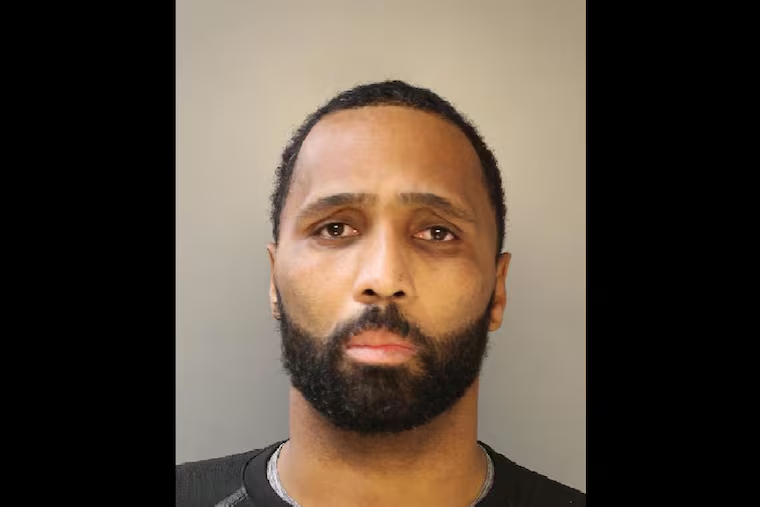Philadelphia police sergeant caught on video punching a handcuffed man is arrested
The charges echo allegations made by defense lawyers, who have rung alarm bells over Reid’s unusually history of citizen complaints, including 10 allegations of physical abuse, and uses of force, including the shootings of six people in the course of duty.

Philadelphia Police Sgt. Jason Reid — who a judge said committed “outrageous” misconduct by assaulting a man and covering it up — was arrested Wednesday morning and charged with assault, tampering with public records, false reports, and obstructing the administration of law.
Reid, 42, a 16-year veteran of the force who spent much of his career in the Highway Patrol unit, was suspended from the department with intent to dismiss after 30 days, according to a police spokesperson, who declined to comment further.
Reid could not be reached for comment Wednesday. John McNesby, president of the Fraternal Order of Police Lodge 5, did not return a phone call.
District Attorney Larry Krasner said the arrest followed an Internal Affairs investigation of an incident that took place June 8.
On that day, Reid placed Ronald Wallace in handcuffs in the back of a police car — and then, body camera footage showed, held Wallace’s head with one hand and punched him in the face with the other. Reid then arrested Wallace for threatening an officer and resisting arrest. In paperwork, he reported that Wallace’s injuries resulted from Wallace repeatedly hitting his own head against the car window.
After viewing that video, Municipal Court Judge Karen Simmons found that Reid had committed “outrageous government conduct.”
“So outrageous that it prevents Mr. Wallace, or any defendant, from having a fair trial under the color of law,” Simmons added, concluding that Reid had incited Wallace to commit the very acts that formed the basis for his arrest.
According to court records, at least five other people had previously filed complaints with Philadelphia police saying Reid punched them in the face or head — but none of those complaints was sustained by the department’s Internal Affairs unit.
In a statement, Krasner expressed gratitude to the department for holding Reid to account in this case.
"The actions Sergeant Jason Reid is alleged by his colleagues in the Philadelphia Police Department to have taken against an innocent member of our community are exactly the sort of actions that undermine trust in law enforcement and make us all less safe,” he said.
The charges echo repeated allegations made by defense lawyers over Reid’s unusually long history of citizen complaints, including 10 allegations of physical abuse, and uses of force, including the shootings of six people in the course of duty. None of the complaints against him were sustained, according to the documents. All of the previous uses of deadly force were deemed to be within department guidelines.
In May of this year, Reid received an official commendation for his role in a traffic stop: a Medal of Bravery “for the performance of an outstanding arrest where the officer’s effort is met by an armed and dangerous adversary.” That was the January 2018 arrest of 22-year-old Stefon Crawley, whom Reid and another officer, Timothy Stephan, shot a total of five times after finding a gun in his possession during a traffic stop.
Despite the officers’ commendations — and their subsequent promotions to the rank of sergeant — the charges of illegal gun possession and assault on police were dismissed against Crawley after the officers were not cleared by prosecutors to testify. Video of the arrest, showing that Crawley had already been disarmed and was fleeing the scene, contradicted an initial police account that Crawley did not drop the gun until after he was shot.
Hans Menos, who heads the civilian Police Advisory Commission, said Reid’s history of being commended and promoted despite the volume of civilian complaints speaks to a culture of failing to discipline problematic officers and instead promoting them into senior positions where accountability becomes more elusive.
“The Police Department is incredibly bad at investigating its own people. We see that in the Carl Holmes case,” he said, referring to an officer who rose to the rank of chief inspector despite sexual-assault allegations, retaining that post until he was charged in October.
“Here we have a guy who is now a supervisor of other police officers," Menos said. "What’s implied by his promotion? ... It’s frankly sickening to have so many folks who shouldn’t be in positions of authority promoted there and celebrated for their abuse of the residents of the city.”